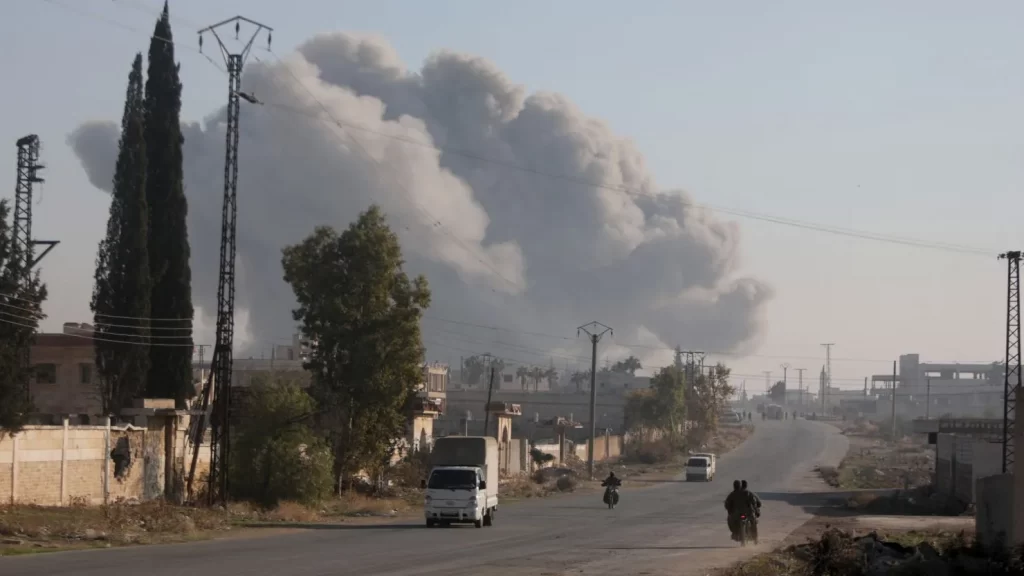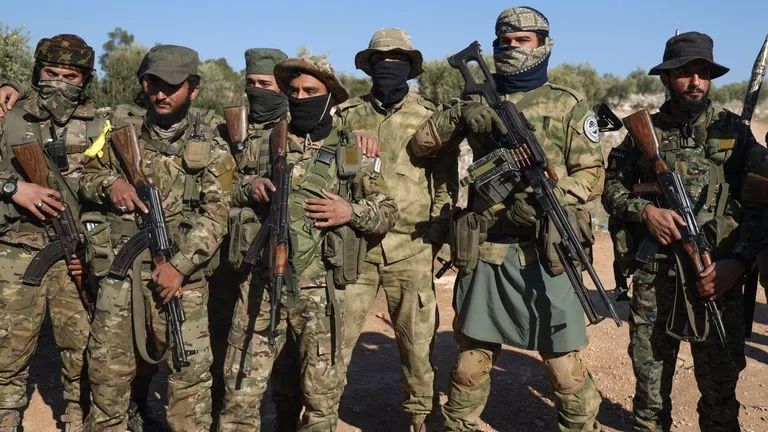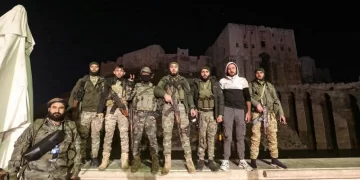Syrian opposition groups have launched a significant offensive titled “Operation Deterring the Invader” in the eastern countryside of Idlib. As a result, they captured the strategic city of Serakib from Syrian regime forces and allied militias. This major advance came after intense clashes and heavy artillery and rocket fire targeting regime positions. Reports indicate that regime forces, having established strongholds in Hamdaniye, 3,000 Evler, and Stadium districts, were forced to retreat.

Progress of the Operation
The opposition made substantial gains in Serakib during the operation’s first day, quickly taking control of key points around the city. Local sources revealed that the offensive began early in the morning with heavy artillery bombardments, enabling the opposition to advance within hours. Serakib’s strategic importance stems from its position at the intersection of the M5 and M4 highways, crucial trade and military routes linking Damascus with Aleppo and Aleppo with Latakia.
Regime and Russia’s Reaction
Following the opposition’s capture of Serakib, Syrian regime forces withdrew, while Russian warplanes launched attacks on civilian areas. These airstrikes, particularly targeting Atarib and Darat Izze in western Aleppo, caused significant destruction. Tragically, 17 civilians lost their lives during these strikes. Analysts believe Russia’s aerial response signals both a warning to the opposition and a demonstration of support for its Syrian ally.
Turkey’s Position
Turkish security sources have stated that the operation remains within the borders of the Idlib de-escalation zone. While Turkey’s military posts in the area are on high alert for potential threats, reports confirm no direct involvement in the operation. Turkey appears to be carefully monitoring the situation, mindful of the humanitarian implications and potential costs of deepening the crisis.
Collapse of Regime Defenses
The opposition’s success in Serakib has exposed vulnerabilities in regime defenses. A weakened presence of Iranian-backed militias and Russia’s shifting focus to Ukraine have further eroded the regime’s resilience. During the operation, opposition groups reportedly seized a significant cache of weapons and vehicles. Additionally, the death of an Iranian military advisor highlights the pressure on the regime and its allies.
Humanitarian Impact and Migration Crisis
The intense conflict has forced large numbers of civilians to evacuate regime-held areas. Over 57,000 people have been displaced due to ongoing airstrikes and clashes. With winter approaching, the humanitarian crisis in Idlib and surrounding regions is deepening, exacerbating the plight of displaced families. Aid organizations have issued urgent appeals for assistance as the already overstretched refugee camps struggle to cope.
Military and Political Objectives
Opposition leaders have outlined their goals as both military and political. Key objectives include reclaiming territories lost in 2019-2020, creating safe zones for the return of millions of refugees, and pushing Iranian militias out of Syria. These efforts aim to solidify the opposition’s position in the conflict while seeking to alter the regional balance of power.
Regional and Global Implications
The developments in northwest Syria could reignite discussions around the Astana process and Turkey-Russia relations. Despite Turkey’s attempts to engage the Syrian regime in dialogue, the regime’s uncompromising stance and Russia’s limited intervention have added complexity to the conflict. Military analysts warn that while the regime’s resistance remains weak, opposition forces must prepare for potential counterattacks. If the operation expands, it could further pressure the regime and potentially revitalize political negotiations.

The Strategic Significance of Serakib
Serakib holds immense value for both sides in the Syrian conflict due to its location and history. The city has changed hands multiple times during the civil war, underscoring its importance. In 2020, regime forces captured Serakib with heavy Russian air support, prioritizing control over the M5 and M4 highways for logistical and strategic reasons. The opposition’s recent victory raises new questions about the regime’s ability to maintain these critical routes.
Factors Behind the Opposition’s Success
Several factors contributed to the opposition’s achievements in this operation. Their effective use of drones disrupted regime defenses, particularly in critical areas like the 46th Brigade base west of Aleppo. Additionally, sustained artillery fire weakened regime positions, diminishing morale and defensive capacity. Military experts also highlight the regime’s logistical challenges and the dwindling presence of Iranian-backed forces as key vulnerabilities exploited by the opposition.
Russia’s Evolving Role
Russia’s response to the developments in 2024 appears more restrained compared to previous years. While Russian air support was decisive in earlier campaigns, its engagement this time has been limited. Analysts attribute this to Moscow’s focus on Ukraine and its efforts to maintain a balanced relationship with Turkey. However, Russia’s airstrikes on civilian areas continue to exacerbate the humanitarian crisis, drawing international criticism.
Turkey’s Approach
Turkey is closely monitoring the situation, ensuring its military posts in Idlib are prepared for any escalation. However, it refrains from directly supporting the operation, focusing instead on maintaining stability in the de-escalation zone and preventing a new wave of migration. Observers suggest Turkey views these developments as a message to the Syrian regime, whose refusal to engage in dialogue and reliance on Russia have contributed to ongoing tensions.
Deepening Humanitarian Crisis
The conflict’s escalation has severely impacted civilians, with thousands forced to flee their homes. Displaced populations now face dire conditions as overcrowded refugee camps struggle to provide shelter and basic necessities. With winter approaching, the risk of a worsening humanitarian disaster looms large. International organizations have called for urgent action to address the needs of those affected by the conflict.
Future of the Conflict
The opposition’s advances in Serakib and surrounding areas could reshape the dynamics of the Syrian civil war. While the regime faces mounting challenges, the possibility of unexpected counterattacks cannot be ruled out. Regional experts believe these developments may revive discussions under the Astana framework or even lead to new agreements between Turkey and Russia. However, broader peace talks, such as those in Geneva, remain unlikely to gain momentum, as they depend more on international political will than on military shifts on the ground.
The recent developments in Serakib underscore the ongoing volatility of the Syrian conflict. While opposition forces aim to transform military victories into political gains, the regime’s response and the actions of regional and global actors will ultimately determine the future trajectory of this war.















